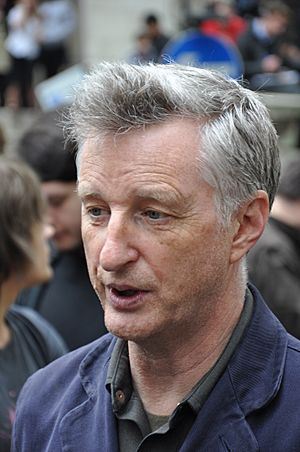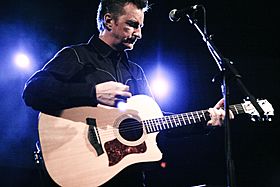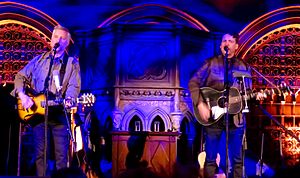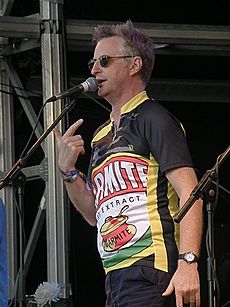Billy Bragg facts for kids
Quick facts for kids
Billy Bragg
|
|
|---|---|

Bragg in 2010
|
|
| Background information | |
| Birth name | Stephen William Bragg |
| Also known as | William Bragg |
| Born | 20 December 1957 Barking, Essex, England |
| Genres |
|
| Occupation(s) |
|
| Instruments |
|
| Years active | 1977–present |
| Labels |
|
Stephen William Bragg (born December 20, 1957) is an English singer, songwriter, and political activist. He is famous for his music that mixes folk music, punk rock, and protest songs. His lyrics often talk about politics or love. As an activist, he works for social change and supports left-wing causes, which focus on equality and helping ordinary people.
Contents
Early Life and Influences
Bragg was born in Barking, Essex, which later became part of London. His father, Dennis, worked for a cap maker, and his mother, Marie, was of Italian heritage. His father passed away from lung cancer in 1976, and his mother passed away in 2011.
As a boy, Bragg enjoyed poetry. He started learning guitar with his neighbor, Philip Wigg. They were inspired by bands like the Faces and the Rolling Stones. He also listened to folk artists like Simon & Garfunkel and Bob Dylan, who influenced his songwriting.
In the late 1970s, punk rock became popular. Bragg was inspired by artists like Elvis Costello and bands like the Jam. A major turning point for him was seeing the band the Clash perform at a Rock Against Racism concert in 1978. This event showed him how music could be used to fight for political causes and shaped his own political beliefs.
Music Career
Starting Out
In 1977, Bragg and his friend Wiggy started a punk band called Riff Raff. The band didn't become famous and broke up in 1980. Feeling disappointed, Bragg briefly joined the British Army in 1981. After three months, he decided it wasn't for him and returned home.
Bragg then started performing solo in London. He played an electric guitar and called himself Spy vs Spy. He made a demo tape but struggled to get a record deal. In a clever move, he pretended to be a TV repairman to get into the office of Peter Jenner, a music executive at Charisma Records. Jenner liked his music and agreed to release an album.
His first album, Life's a Riot with Spy vs Spy, came out in 1983. One day, Bragg heard the famous DJ John Peel say he was hungry on the radio. Bragg rushed to the BBC studio with a mushroom biryani for him. Peel then played Bragg's song "The Milkman of Human Kindness" on his show, which helped Bragg become more well-known.

Growing Fame in the 1980s
In 1984, Bragg released his second album, Brewing Up with Billy Bragg. It featured a mix of political songs and love songs. His song "A New England" became a Top 10 hit for singer Kirsty MacColl in 1985 after she added an extra verse.
Bragg became known for his political music. He released an EP called Between the Wars in 1985. The songs were about the struggles of working-class people. This earned him a spot on the popular TV show Top of the Pops.
In 1986, his album Talking with the Taxman About Poetry was a Top 10 hit. In 1988, he had his only Number 1 single with a cover of the Beatles' song "She's Leaving Home". It was part of a charity album for the organization Childline.
New Directions in the 1990s
Bragg's music continued to evolve. His 1991 album, Don't Try This at Home, had a more commercial pop sound. The first single, "...", reached Number 27 on the UK charts.
After taking a break to spend time with his family, he released William Bloke in 1996. The album had a simpler sound and more personal lyrics. The title is a play on the name of the famous English poet William Blake.
Later in the 1990s, Nora Guthrie, the daughter of American folk legend Woody Guthrie, asked Bragg to write music for her father's unfinished lyrics. Bragg worked with the band Wilco on this project. They released two albums, Mermaid Avenue (1998) and Mermaid Avenue Vol. II (2000). The first album was even nominated for a Grammy Award.
Career in the 21st Century
In the 2000s, Bragg continued to explore his interest in English identity. His 2002 album England, Half-English included the song "Take Down The Union Jack," which he performed on Top of the Pops. In 2008, he released the album Mr. Love & Justice.
Bragg has remained a busy performer and creator. In 2013, he released Tooth & Nail, which was recorded in just five days. The album had an Americana and country feel and was a big success.

In 2016, he worked with American musician Joe Henry on the album Shine a Light. They recorded the songs while traveling across America by train. The album topped the UK Americana chart.
Bragg has also written several books. Roots, Radicals and Rockers (2016) is a history of the British music style called skiffle. His most recent studio album, The Million Things That Never Happened, was released in 2021.
In 2023, Bragg celebrated 40 years of making music with a compilation album series called The Roaring Forty (1983–2023) and a major tour.
Political Activism
Throughout his career, Bragg has used his music to talk about political issues. He believes in using his fame to support causes he cares about, like workers' rights and fighting against unfairness. He was inspired by the band the Clash, who showed him that musicians could take action for their beliefs.
Fighting for Change
In the 1980s, Bragg became a leading voice during the miners' strike. He played many benefit concerts to support the striking miners and their families. He also helped form Red Wedge, a group of musicians who encouraged young people to get involved in politics.
Bragg has always been a strong opponent of racism and other forms of prejudice. He has spoken out against far-right political groups that promote hateful ideas. He believes in a Britain where people of all backgrounds are welcome.
Modern Activism
Bragg continues to be an activist today. In 2007, he started Jail Guitar Doors, an organization that gives musical instruments to prisoners. The goal is to help them express themselves in a positive way.
He has also been involved in many protests. He supported the Occupy Movement and has spoken about the need for a fairer society. When former Prime Minister Margaret Thatcher died in 2013, he encouraged people not to celebrate but to organize and work for positive change.
Bragg has also supported independence movements in both Scotland and Wales. He believes that people should have the right to decide their own future. He often supports the Labour Party and has encouraged tactical voting to achieve political goals.
Personal life
Bragg and his partner, Juliet, have a son named Jack Valero, who is also a singer-songwriter. Bragg is a fan of the West Ham United F.C. football club.
Discography
- Life's a Riot with Spy vs Spy (1983)
- Brewing Up with Billy Bragg (1984)
- Talking with the Taxman About Poetry (1986)
- Workers Playtime (1988)
- The Internationale (1990)
- Don't Try This at Home (1991)
- William Bloke (1996)
- England, Half-English (2002) (with the Blokes)
- Mr Love & Justice (2008)
- Tooth & Nail (2013)
- Bridges Not Walls (2017)
- The Million Things That Never Happened (2021)
See also
 In Spanish: Billy Bragg para niños
In Spanish: Billy Bragg para niños


